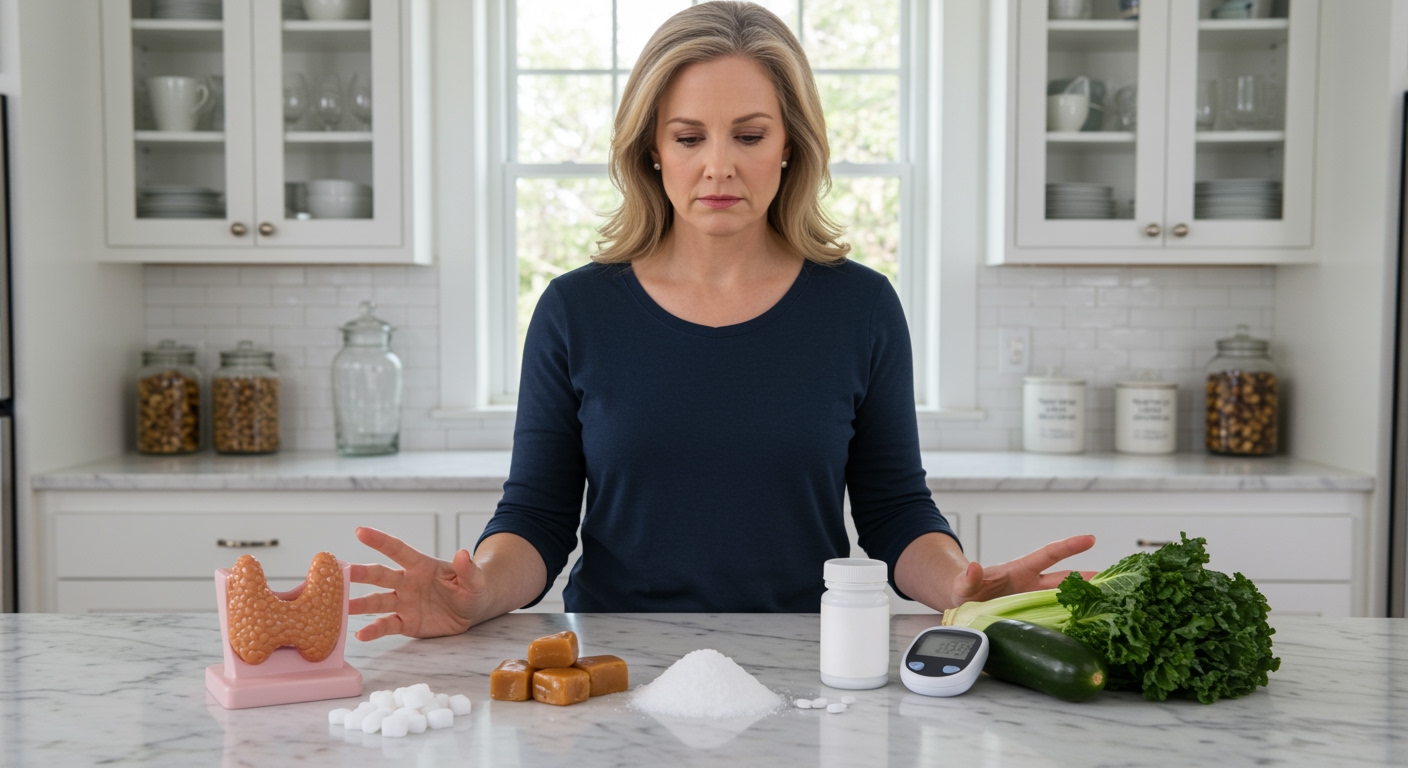✪ Key Takeaway: Toffee is not always bad for hypothyroidism, but timing and portion control matter significantly for medication effectiveness.
Introduction
You love toffee but your doctor just diagnosed you with hypothyroidism.
Now you are wondering if you need to give up this sweet treat forever or if there is a way to enjoy it safely.
Hi, I am Abdur, your nutrition coach and today I am going to explain exactly how toffee affects your thyroid health and when you can enjoy it without worrying.
What Makes Toffee Different From Other Sweets?
Toffee is made by heating butter and sugar together until it reaches a hard crack stage.
This process creates a candy that is extremely high in both simple sugars and saturated fats.
One small piece of toffee contains about 50 to 70 calories with nearly 80 percent coming from sugar and fat combined.
The combination of butter and sugar makes toffee digest slowly compared to pure sugar candies.
This slower digestion can actually work in your favor when managing blood sugar levels.
However, the high calorie density means even small amounts can add up quickly throughout your day.
✪ Fact: Traditional English toffee contains about 150 calories per ounce, which is roughly three small pieces.
How Does Sugar Impact Thyroid Function?
Your thyroid gland needs proper insulin sensitivity to function optimally.
When you eat high amounts of sugar regularly, your body becomes less sensitive to insulin over time.
This insulin resistance can interfere with how your body converts T4 thyroid hormone into the active T3 form.
Research published in clinical studies shows that people with insulin resistance often have lower T3 levels even when taking thyroid medication.
High sugar intake also triggers inflammation throughout your body including your thyroid gland.
This inflammation can worsen autoimmune conditions like Hashimoto thyroiditis, which is the most common cause of hypothyroidism.
The key problem is not one piece of toffee but rather the cumulative effect of eating sugary foods throughout your day and week.
✪ Note: Your body can handle occasional sugar intake without significant thyroid impact if your overall diet remains balanced.
Does Toffee Interfere With Thyroid Medication?
The timing of when you eat toffee matters more than the toffee itself when taking thyroid medication.
Thyroid medications like levothyroxine need to be absorbed in your empty stomach for maximum effectiveness.
Foods high in sugar and fat can slow down stomach emptying and reduce how much medication your body absorbs.
Medical guidelines recommend waiting at least 30 to 60 minutes after taking thyroid medication before eating anything.
If you eat toffee or any other food too soon after your medication, you might not get the full therapeutic dose your doctor prescribed.
This can lead to symptoms returning even though you are taking your medication regularly.
The solution is simple: take your medication on an empty stomach first thing in the morning and wait at least one hour before having breakfast or any treats.
✪ Pro Tip: Set a daily alarm for one hour after taking your thyroid medication to remind yourself when you can safely eat breakfast.
Can Weight Gain From Toffee Worsen Hypothyroidism?
Hypothyroidism already makes losing weight more difficult because your metabolism slows down.
Adding high calorie foods like toffee to your diet can create a calorie surplus that leads to weight gain.
Excess body weight, especially around your midsection, increases inflammation and worsens insulin resistance.
This creates a vicious cycle where weight gain makes your thyroid function worse and poor thyroid function makes weight management harder.
Studies show that even a 5 to 10 percent reduction in body weight can improve thyroid hormone levels in people with hypothyroidism.
The good news is that you do not need to eliminate toffee completely to maintain a healthy weight.
You just need to account for those extra calories in your daily intake and make sure you are not exceeding your energy needs consistently.
✪ Fact: People with untreated hypothyroidism burn about 10 to 15 percent fewer calories at rest compared to those with normal thyroid function.
When Can You Safely Enjoy Toffee?
You can enjoy toffee safely when you follow three simple rules about timing, portion, and frequency.
First, eat toffee at least four hours after taking your thyroid medication to avoid any absorption issues.
Second, limit your portion to one or two small pieces, which equals about 100 to 150 calories maximum.
Third, treat toffee as an occasional indulgence rather than a daily habit, perhaps once or twice per week.
The best time to eat toffee is after a balanced meal that contains protein, healthy fats, and fiber.
This combination slows down sugar absorption and prevents the rapid blood sugar spike that can worsen insulin resistance.
If you are managing your weight actively or have autoimmune thyroid disease, consider saving toffee for special occasions only rather than regular weekly treats.
✪ Pro Tip: Pair your toffee with a handful of nuts to add protein and fiber that stabilizes your blood sugar response.
The Bottom Line
Toffee is not inherently bad for hypothyroidism when you consume it mindfully with proper timing and portion control.
Your health is not destroyed by occasional treats but by the daily habits you repeat consistently, so focus on making your everyday choices nutritious while allowing room for enjoyment.
I would love to hear your experience with managing sweet cravings while dealing with hypothyroidism, so please share your thoughts or questions in the comment section below.
References
At NutritionCrown, we use quality and credible sources to ensure our content is accurate and trustworthy. Below are the sources referenced in writing this article:





